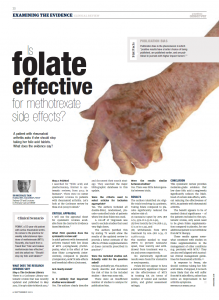 This article was published in Medical Observer.
This article was published in Medical Observer.
The article is also available on the Medical Observer website (may need registration).
Clinical scenario
Penny, a 55-year old lady with active rheumatoid arthritis, comes to the practice for weekly subcutaneous injections of methotrexate (MTX). Recently, she heard from a friend that “folic acid makes methotrexate less effective” and she asked me, “should I stop my folic acid tablets?”
Clinical question
How much does folic acid reduce the side-effects, and effectiveness, of MTX treatment in patients with rheumatoid arthritis?
What does the research evidence say?
Step 1: The Cochrane Library
here is a Cochrane Library systematic review that was just recently updated and published in May 2013. It is up-to-date to March 2012. [1]
Step 2: PubMed
I searched for “(folic acid) and (methotrexate); limited to systematic reviews; from 2012; in humans”. There were no newer systematic reviews in patients with rheumatoid arthritis. Let’s look at the Cochrane review by Shea et al. (2013) in detail. [1]
Critical appraisal
I will use the appraisal sheet for systematic reviews available from the Centre for Evidence Based Medicine. [2]
What PICO question does the systematic review ask?
In adult patients with rheumatoid arthritis treated with low doses of MTX (≤ 25 mg/week) (Participants); what is the effect of low dose folate (≤ 7 mg/week) (Intervention); compared to placebo (Comparator); on MTX side-effects and beneficial effects (Outcome).
Is it clearly stated?
Yes.
Is it unlikely that important studies were missed?
Yes. The authors clearly describe and document their search strategy. They searched the major bibliographic databases in this update.
Were the criteria used to select articles for inclusion appropriate?
Yes. The authors included all double-blind, randomised, placebo-controlled trials of patients where low dose folate was used. A cut-off of 7 mg/week was used to exclude studies that used very high doses. The authors justified this by stating, “it would allow the results of the updated review to provide a better estimate of the effects of folate supplementation at doses currently prescribed in practice.” (p. 9). [1]
Were the included studies sufficiently valid for the question asked?
Unclear, probably yes. The authors clearly describe and document the risk of bias in the included studies (Figures 2 and 3, p. 13-14) [1] – there was some risk. There were an insufficient number of included studies to analyse for the possibility of publication bias.
Were the results similar between studies?
Yes. There was little heterogeneity between trials.
What were the results?
The authors identified 6 eligible trials involving 624 patients. Taking folate as compared to placebo significantly reduced the relative risk of:
- nausea/GI upset by 26% (RR 0.74, 95% CI 0.59 to 0.92)
- liver toxicity by 77% (RR 0.23, CI 0.15 to 0.34), and
- withdrawals from MTX treatment by 61% (RR 0.39, CI 0.28 to 0.53).
The number needed to treat (NNT) to prevent nausea/GI upset, liver toxicity and withdrawal from treatment was 11, 6 and 7 respectively.
No statistically significant results were found for stomatitis or neutropaenia. Folate did not appear to have a statistically significant impact on the effectiveness of MTX in treating RA (in terms of number of tender and swollen joints, and global assessment ratings).
Conclusion
This systematic review provides moderate grade evidence that low dose folic acid (≤ 7 mg/week) significantly reduces the likelihood of certain side-effects, without reducing the effectiveness of MTX, in patients with rheumatoid arthritis. The benefit appears to be of marked clinical significance – of the patients included in this systematic review, only 7 needs to be given folate supplementation as compared to placebo, for 1 additional patient to not withdraw from MTX therapy.
These results appear somewhat consistent with studies on folate supplementation in the management of other conditions (e.g., psoriasis) with MTX. [3] They are also well aligned with Australian clinical management guidelines for rheumatoid arthritis. [4-5]
In response to Penny, she should continue taking her folic acid tablets! If stopped, it is much more likely that she will suffer from MTX side-effects, rather than notice an improvement in her arthritis symptoms.
Stat Facts
Publication bias
Publication bias is the phenomenon in which “positive results have a better chance of being published, are published earlier, and are published in journals with higher impact factors.” (p. 433). [6]
References
- Shea B, Swinden MV, Tanjong Ghogomu E, Ortiz Z, Katchamart W, Rader T, Bombardier C, Wells GA, Tugwell P. Folic acid and folinic acid for reducing side effects in patients receiving methotrexate for rheumatoid arthritis. Cochrane Database of Systematic Reviews 2013, Issue 5. Art. No.: CD000951. DOI: 10.1002/14651858.CD000951.pub2
- Systematic Review: Are the results of the review valid? Centre for Evidence Based Medicine, University of Oxford. http://www.cebm.net/index.aspx?o=1157 Retrieved: 2013 August 7
- Al-Dabagh A, Davis SA, Kinney MA, Huang K, Feldman SR. The effect of folate supplementation on methotrexate efficacy and toxicity in psoriasis patients and folic acid use by dermatologists in the USA. Am J Clin Dermatol 2013; 14(3): 155-161. DOI: 10.1007/s40257-013-0017-9
- Clinical guideline for the diagnosis and management of early rheumatoid arthritis. South Melbourne, Australia: The Royal Australian College of General Practitioners; 2009 Aug. Available: http://www.racgp.org.au/download/documents/Guidelines/Musculoskeletal/racgp_ra_guideline.pdf
- Rheumatoid arthritis: pharmacological management. eTG complete 2013 [updated 2010 Oct; cited 2013 Aug 7]. Available from: http://etg.tg.com.au
- Hans-Hermann D, Hans-Peter B. Systematic review of publication bias in studies on publication bias. BMJ 2005; 331: 433-434. DOI: 10.1136/bmj.38478.497164.F7
